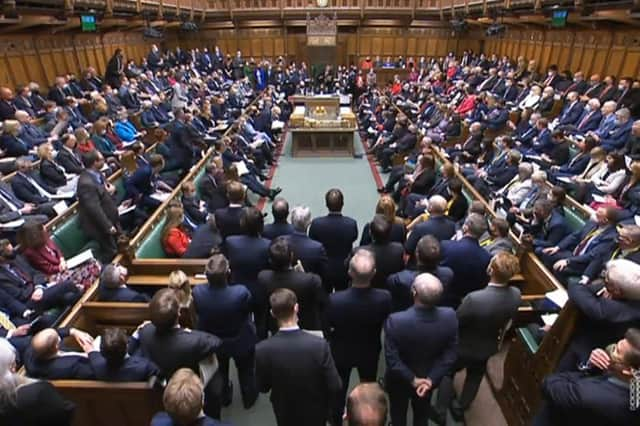In the Commons: what does your Ripon MP Julian Smith do?


In the first of this series, analysis shows how often the Conservative MP for Skipton and Ripon has voted, how many debates he has taken part in, and how many parliamentary questions he has asked since the last general election.
The figures, from the House of Commons Library, show the activities of MPs between the state opening of Parliament on December 16 2019 and March 7 this year.
Advertisement
Hide AdAdvertisement
Hide AdOf the 491 votes over this time, Julian Smith, who serves as a backbench MP, recorded 398 ayes or noes.
He recorded no vote, or abstained, on 93 occasions – giving the Tory representative a participation rate of 81%.
This was equal to the average for all UK politicians who have sat in the House of Commons since the election (excluding the Speakers).
Several MPs had participation rates as high as 95%, while fellow Tory MP Sir Christopher Chope voted in just 36% of divisions.
Advertisement
Hide AdAdvertisement
Hide AdThe Conservatives had the highest average rate of 86%, while Alba's two Scottish MPs had the lowest – just 51%.
Meanwhile, Labour had an overall rate of 77%.
The HoC Library said MPs may not vote because they are carrying out other work related to their parliamentary, government or opposition roles.
And participation rates may be affected by ‘pairing arrangements’, whereby MPs from different parties who cannot attend a division agree to cancel out one another’s vote.
Before divisions, debates are held for Members to discuss government policy, new laws and topical issues of the day to help the House reach an informed decision.
Advertisement
Hide AdAdvertisement
Hide AdSince the last election, Mr Smith, 50, has taken part in 29 debates, speaking a total of 9,495 words.
By comparison, the average MP has spoken 44,530 words over the same period, Prime Minister Boris Johnson around 394,000 and Democratic Unionist Party MP Jim Shannon a whopping 560,000.
These include spoken contributions and oral questions in the House of Commons chamber and in Westminster Hall, but not those shorter than four words.
The figures also show Julian Smith, who was elected to his seat on May 6, 2010, has asked 14 Parliamentary Questions since the last election.
Advertisement
Hide AdAdvertisement
Hide AdThese are put formally to a government minister about a matter they are responsible for – to seek information or to press for action from the Government.
This included zero put to a government minister in writing and zero topical questions – those asked during the last 15 minutes of most ministerial question sessions.
And he asked six during Prime Minister's Questions – the weekly session when the PM faces scrutiny in the House.
